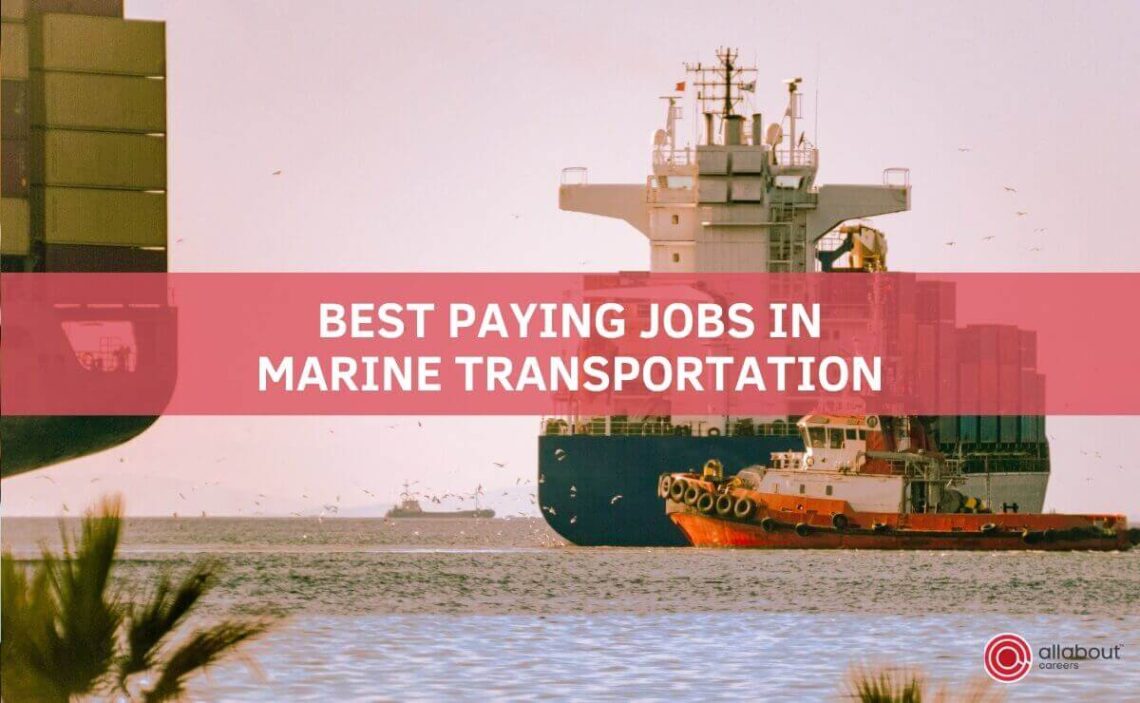Shipping is one of the most fundamental industries for the global economy since it’s essential to many others. The ability to move large volumes of cargo across the oceans efficiently and safely has driven economic growth worldwide.
However, behind this dynamic industry are highly skilled and specialized professionals in a variety of areas which make the efficient running of ships and port operations possible.
But before considering this industry as a career path for you, here’s information about some of the best jobs you can find, how to specialize in them and what requirements you need to fulfil.
Top 5 Jobs in Marine Transportation
We know that this is probably not your first option to work or specialize, in fact, you may be wondering: Is Marine Transportation a Good Career Path?
And the answer is: Yes. Although it is not so easy to enter this world, if you put in effort and dedication it can be a very profitable and lucrative option for your future.
These are the roles you could aspire to:
Ship Captain

The captain is the person in charge of the ship and its crew, his primary function is to ensure the safe and efficient navigation of the boat, follow and comply with maritime regulations and maintain the safety of the cargo and crew. It is a job that requires extensive experience and leadership skills.
Cargo ship captains can earn approximately USD 80,000 to USD 150,000 per year, depending on the type and size of the vessel and the route it covers.
Marine Engineer
People working in Marine Engineering are responsible for the operation and maintenance of the ship’s systems and machinery. Their work ensures that all systems, from the main engine to the navigation equipment and cargo facilities, are in perfect operating condition.
In this case, a solid technical background in marine or mechanical engineering is required. In this case, Marine Engineers can earn between USD 70,000 and USD 120,000 per year.
Deck Officer
Deck Officers are the command team that assists the captain in the navigation and operation of the ship. Their tasks include supervising loading and unloading, maintaining navigational records, and implementing safety measures on board.
Deck officers can earn approximately USD 60,000 to USD 100,000 per year.
Chief Engineer Officer
The Chief Engineer Officer is the head of the ship’s Engineering department (including the Marine Engineer). He coordinates and supervises Marine Engineers and Technicians in the maintenance and repair of the ship’s machinery and systems. It is a highly responsible position and extensive Marine Engineering experience is required.
Chief Engineers can earn between USD 75,000 and USD 130,000 per year.
Port Operations and Logistics Specialist
The Port Operations and Logistics Specialist plays a crucial role in planning and coordinating seaport activities. His responsibility includes the efficient reception, storage and shipment of cargo, as well as inventory management and optimization of logistics processes. He works closely with port authorities, shipping lines and transport companies to ensure smooth and efficient operations.
In this role, people can earn approximately USD 60,000 to USD 100,000 per year, depending on the size and volume of the port in which they work.
What to Study for a Career in Marine Transportation
To enter the Marine Transportation world, it is essential to receive proper education and training. There are several academic and training options for those interested in working in this industry.
1. Bachelor’s Degree in Nautical and Maritime Transportation
This degree offers a solid background in navigation, port operations, maritime regulations and ship management. Graduates obtain the title of Merchant Marine Officer, which allows them to work as Deck Officers on board ships. The duration of the career is approximately 4 years.
2. Bachelor’s Degree in Marine or Mechanical Engineering
These degrees are focused on training highly qualified Marine Engineers to maintain and operate ship systems and machinery. Marine Engineers can work either on deck or in the engine department. The duration of these careers is approximately 4 years.
3. Specialized courses and certifications
In addition to university degrees, some specialized courses and certifications complement Maritime Transportation training. For example, there are training programs in marine safety, port operations and cargo management. These courses can vary in length, from a few days to several months, depending on the subject matter.
What are the requirements to work in this area?
To work in Marine Transportation, it is necessary to meet certain requirements and obtain the corresponding licenses and certifications besides having a degree. These are the required ones in the US:
STCW Certification
The International Convention on Standards of Training, Certification and Watchkeeping for Seafarers (STCW) establishes the minimum standards of training and competence for maritime personnel worldwide. To embark on a commercial vessel, it is mandatory to have STCW certification, which is obtained through courses and training approved by the maritime authorities.
Practical experience
Many positions in shipping require practical experience at sea. It is common for recent graduates of nautical or marine engineering careers to begin their careers as cadets or apprentices aboard ships to gain experience and sea hours.
Health and Fitness
Working in shipping can be physically demanding and requires good general health. It is necessary to pass medical examinations and meet established fitness standards to obtain maritime licenses.
English language proficiency
English is the universal language in shipping and is essential for safe and effective communication on board ships and ports. Most maritime licenses require demonstrating an adequate level of English language proficiency.
References
-
International Convention on Standards of Training, Certification and Watchkeeping for Seafarers (STCW). (2023, June 13th). In International Maritime Organization. https://www.imo.org/en/About/Conventions/Pages/International-Convention-on-Standards-of-Training,-Certification-and-Watchkeeping-for-Seafarers-(STCW).aspx


